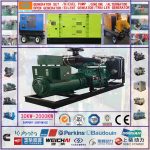Introduction
In today's world, electricity is a fundamental requirement for almost all aspects of modern life. From powering homes and businesses to driving industries and infrastructure, reliable access to electricity is crucial. When find out here now or fails to meet the demand, backup power sources such as diesel generators play a vital role in ensuring continuity of operations. Diesel generators are known for their reliability, efficiency, and ability to provide backup power during emergencies. In recent years, the concept of parallel operation of diesel generators with the grid has gained popularity as a way to enhance power efficiency and reliability. This article explores the benefits, challenges, and considerations of using diesel generators for parallel operation with the grid.
Overview of Diesel Generators
Diesel generators are a type of internal combustion engine that converts diesel fuel into mechanical energy, which is then converted into electricity through an alternator. These generators are widely used in various applications, including residential, commercial, industrial, and emergency backup power systems. Diesel generators are favored for their high efficiency, robustness, and long service life. They are particularly suitable for applications where continuous power supply is critical, such as hospitals, data centers, and manufacturing facilities.
Parallel Operation with the Grid
Parallel operation of diesel generators with the grid involves connecting multiple generators to the main grid to supply electricity collectively. This setup allows the generators to operate in synchronization with the grid, providing additional power when needed or acting as a backup during grid failures. The parallel operation of diesel generators offers several advantages, including increased power capacity, improved system reliability, and enhanced efficiency.
Benefits of Parallel Operation
1. Increased Power Capacity: By connecting multiple diesel generators in parallel with the grid, the total power capacity of the system can be significantly increased. This allows for greater flexibility in meeting varying power demands, especially during peak load periods or in case of sudden spikes in electricity consumption.
2. Enhanced System Reliability: Parallel operation of diesel generators with the grid enhances the overall reliability of the power system. In the event of a grid outage or failure, the generators can seamlessly take over the load, ensuring uninterrupted power supply to critical loads. This redundancy minimizes the risk of downtime and disruptions, particularly in mission-critical applications.
3. Improved Efficiency: Operating diesel generators in parallel with the grid enables better utilization of resources and enhances overall energy efficiency. By distributing the load among multiple generators based on demand, the system can operate at optimal efficiency levels, reducing fuel consumption and operational costs.
Challenges and Considerations
While the parallel operation of diesel generators with the grid offers numerous benefits, there are also challenges and considerations that need to be addressed to ensure successful integration and operation:
1. Synchronization and Control: Achieving synchronization between the generators and the grid is crucial to ensure seamless operation and prevent electrical disturbances. Proper control systems and synchronization devices are required to maintain frequency and voltage stability during parallel operation.
2. Protection and Safety: Ensuring the safety of personnel and equipment is paramount when operating diesel generators in parallel with the grid. Proper protection devices, grounding systems, and safety protocols must be in place to prevent overloads, short circuits, and other potential hazards.
3. Grid Compatibility: Diesel generators must be compatible with the grid in terms of voltage, frequency, and power quality to ensure smooth parallel operation. Grid codes and standards must be followed to maintain system stability and prevent any adverse impacts on the grid.
4. Maintenance and Monitoring: Regular maintenance and monitoring of diesel generators are essential to ensure optimal performance and reliability. Monitoring systems for real-time data collection, remote diagnostics, and predictive maintenance can help prevent unexpected failures and downtime.
5. Cost and Investment: The initial cost of setting up a parallel operation system with diesel generators can be significant, including equipment, installation, and integration expenses. However, the long-term benefits in terms of enhanced reliability, efficiency, and operational flexibility can outweigh the upfront investment.
Conclusion

Diesel generators play a crucial role in providing backup power during grid failures and emergencies. The concept of parallel operation with the grid offers a practical and efficient way to enhance power capacity, reliability, and efficiency. By connecting multiple generators in parallel, users can benefit from increased power availability, improved system redundancy, and optimized energy utilization. However, successful integration and operation of diesel generators in parallel with the grid require careful planning, adherence to standards, and proper maintenance practices. With the right approach and considerations, diesel generators can serve as reliable and cost-effective solutions for meeting the growing demand for continuous and stable power supply in various applications.
